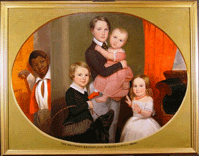Bath, NY 14810



Magee House History
John Magee became a very wealthy man. He established the Bank of
Steuben County in Bath, which was located in the building on Pulteney
Park which became home to the Masonic Temple until recently, and had a
bank in New York City. He and William McCay were the main officers of
the Steuben County Bank. Magee had been with Constant Cook in his bank
for a while; then later they became rivals, finally each trying to
outdo the other in the churches they would build in Bath and Watkins
Glen.
In the political struggle of New York City bankers to wrest control
away from Philadelphia bankers, Magee sided with Andrew Jackson against
Nicholas Biddle and his bank in Philadelphia. At this time Magee was
running for elective office in Bath and was known to support Jackson.
Just a few days before the election, a political poster appeared in
Bath disclaiming this position, signed by “John Magee.” His
opponenets had printed this bill and found another John Magee to sign
it. Magee didn’t have time to expose their ruse before the
voting, and he was defeated. Whether this ploy confused his supporters
isn’t known. John Magee soon moved from Bath to Watkins Glen
where he built a church to rival Cook’s St. Thomas Episcopal in
Bath.
Ambrose Spencer Howell bought the house in Bath from Magee in 1863. The
Howell family lived there until 1885. The Howells were merchants, and
built the cast-iron front building on Liberty Street where the Sports
Station is now. When Magee sold the house, he reserved the iron picket
fence, two hitching posts, two iron dogs, and two large chandeliers in
the parlor of the house. The story is that he never took them. He died
in 1868, five years after leaving Bath, leaving an estate of eleven
million dollars.
